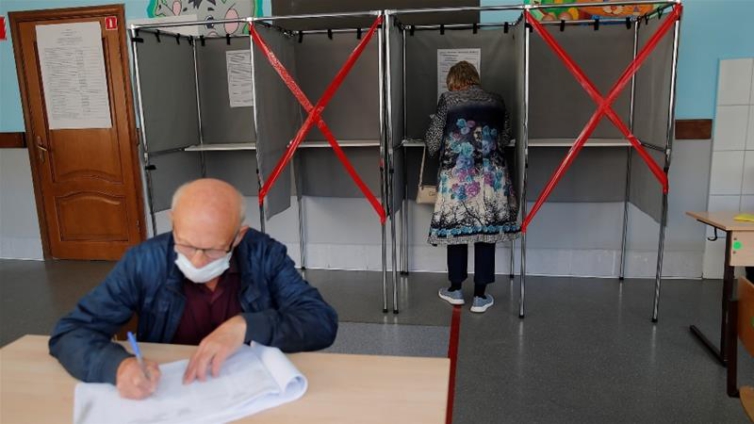Coming a year before parliamentary elections, the elections are seen as a key test of the Kremlin's electoral machine.
Russians are voting in regional elections overshadowed by the poisoning of main opposition figure Alexey Navalny, an economic crisis exacerbated by the coronavirus pandemic and mass protests in some parts of the country.
The elections are being held in Russia's 41 regions where people are casting their ballots for regional governors and assemblies, as well as in four by-elections for national MPs.
Reporting from Moscow, Al Jazeera's Aleksandra Stojanovich-Godfroid said on Sunday the polls are viewed as a "major test" for the ruling United Russia party and President Vladimir Putin, who have both seen their ratings drop a year before parliamentary polls.
United Russia, which currently dominates the federal parliament and many regional administrations, is the party most closely associated with Putin. The longtime president, however, is not a current member of any political party and is thus able to distance himself from unpopular measures initiated by subordinate senior officials.
Last month, a nationwide survey by Russia's biggest independent pollster, Levada Centre, showed that 29 percent of Russians would participate in anti-government protests if held in their area.
Tatyana Stanovaya, head of the R.Politik analysis firm, said the results of the polls will help the Kremlin determine whether United Russia needs to be reformed and if parliamentary elections should be pushed forward.
Navalny's poisoning could also influence voters and bring about "contradictory effects", Stanovaya told AFP news agency.
The 44-year-old, an anti-corruption crusader who is one of Putin's fiercest critics, fell ill on a flight back to Moscow from Siberia on August 20 and was taken to a hospital in the Siberian city of Omsk after the plane made an emergency landing.
After he was evacuated to Berlin, German doctors said Navalny had been poisoned with a Novichok nerve agent.
His associates believe the use of the banned chemical weapon shows only the Russian state could be responsible. The Kremlin has rejected any suggestion that Russia was to blame.
'Smart voting'
Led by Navalny, the opposition hopes to challenge Kremlin domination over Russia's political life by promoting tactical voting, urging Russians to back the strongest candidate on the ballot to defeat the ruling party.
Navalny's team urged Russians to vote for candidates from any party other than United Russia - Navalny had been in Siberia to promote the so-called "smart voting" when he fell ill.
Any other candidate - "a Communist, a Liberal Democratic Party member, a Just Russia party member" - would be "better than United Russia," Navalny's team said in a statement on Friday, referring to Russia's four major political parties.
"Elections can be won," it added, pointing to the far eastern city of Khabarovsk, where tens of thousands have taken to the streets there for the past two months over the arrest of a governor who defeated an incumbent from the governing party in 2018.
With Navalny still recovering and absent from Russia's political scene, the "smart voting" campaign he had launched may be undermined, Stanovaya said.
"On the other hand, what happened to Navalny caused a shock," Stanovaya said, noting that some of those who did not support him in the past may now change their minds.
In what some observers believe is another Kremlin ploy to dilute the opposition vote, candidates are also standing for four little-known new parties.
'Unite the opposition'
With United Russia facing a deep popularity crisis, elections in the country are for the first time being held over three days and some polling stations will be open-air.
Early voting began on Friday and the main polling day is on Sunday.
The controversial three-day voting scheme was first tested during a July 1 national vote on constitutional amendments that could make it possible for Putin to stay in power until 2036.
One of the highest-profile campaigns has taken place in Novosibirsk, where the head of Navalny's office in Russia's third-largest city, Sergei Boiko, brought together the opposition to counter United Russia and the Communist Party.
His "Novosibirsk 2020" coalition has put forward about 30 candidates for the city legislature and campaigned with the help of volunteers from Navalny's Anti-Corruption Fund.
"This is an attempt to unite the opposition, all the people who are saying 'no' to the current regime," Boiko told AFP.
The case of the former Khabarovsk governor and the protest movement in Russia's neighbour Belarus have both sparked small-scale demonstrations in solidarity in Russian cities, suggesting there is growing potential for a protest vote.
Latest Stories
-
Finance Minister to unveil Mahama’s 2025 Budget today
14 minutes -
Philippines’ ex-President Rodrigo Duterte arrested at ICC’s request over ‘drugs war’, government says
35 minutes -
Cowbell-GES Independence Day Debate: Gomoa Senior High Technical outshines Serwaa Kesse Girls’ SHS to win contest
51 minutes -
Geisha champions women’s empowerment and progress at 7th National Women’s Summit & Expo
1 hour -
Musk’s Tesla facilities in US face ‘Takedown’ protests
1 hour -
Charity M. E. Adupong’s vision of promoting food security and empowering women in agricbusiness
1 hour -
Stocks fall in US and Asia over Trump tariffs concerns
2 hours -
Liverpool need best display of season to beat PSG – Slot
2 hours -
King and Kate return to annual Commonwealth service
2 hours -
US unveils new app for ‘self-deportations’
2 hours -
More than 80% of USAID programmes ‘officially ending’
2 hours -
Ayra Starr, Mofe-Damijo to join Idris Elba as cast of ‘Children of Blood and Bone’
3 hours -
Businessman, farmer granted bail for allegedly defrauding estate developer
3 hours -
Nigeria’s anti-graft agency recovers nearly $500m in one year
3 hours -
NDC Sowutuom branch organiser granted GH¢100,000 bail pending appeal
3 hours

